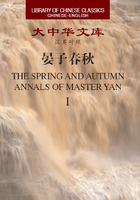
1.6 [6] 景公夜听新乐而不朝晏子谏
齐景公夜里听新作之乐而不上朝,晏子进谏
【原文】
晏子朝,杜扃望羊待子朝。晏子曰:“君奚故不朝?”对曰:“君夜发不可以〔朝〕。”晏子曰:“何故?”对曰:“梁丘据扃入歌人虞,变齐音。”晏子退,命宗祝修礼而拘虞,公闻之而怒曰:“何故而拘虞?”晏子曰:“以新乐淫君。”公曰:“诸侯之事,百官之政,寡人愿以请子。酒醴之味,金石之声,愿夫子无与焉。夫乐,何(夫必)〔必夫〕(攻)〔故〕哉?”对曰:“夫乐亡而礼从之,礼亡而政从之,政亡而国从之。国衰,臣惧君之逆政之行。有歌,纣作北里,幽厉之声,顾夫淫以鄙而偕亡。君奚轻变夫故哉?”公曰:“不幸有社稷之业,不择言而出之,请受命矣。”
【今译】
1.6 [6] DUKE JING LISTENED TO NEW MUSIC DURING THE NIGHT AND COULD NOT CARRY OUT COURT DUTIES. YANZI REMONSTRATED.
When Yanzi went to the court for an audience,Du Jiong[1] was already there waiting for his own audience,gazing into the distance.
Yanzi said: “Why does the Duke not hold court?”
Du Jiong answered: “The Duke was awake all night and therefore he cannot hold court.”
Yanzi said: “How did this come about?”
Du Jiong answered: “Liangqiu Ju[2] has brought in the singer Yu,who altered the sound of a traditional Qi melody.”
Yanzi retired from the audience hall and ordered the M aster of Sacrifices and the Invocator to implement the rules of the rites and to seize Yu.
When the Duke heard this,he was furious and said: “Why did you have Yu arrested?”
Yanzi replied: “Because the new music led you into debauchery,my Lord.”
The Duke said: “I w ish to consult w ith you concerning affairs of the regional princes and the affairs of the various governmental offices. However,Master,I do not w ish you to meddle w ith my taste in w ine and sweet liquor and the sound of bronze and stone instruments. Why does music always have to be played in accordance with the old fashion?”
Yanzi answered: “When music perishes,the rites follow suit; when the rites perish,the government follows suit; when the government perishes, the state follows suit and declines.[3] I am fearful that you,my Lord,have carried out a perverse policy.[4] The debauched and vulgar character of the composition of the Northern-District Dances,commissioned by Zhou,[5] as well as the music of You and Li,[6] makes it clear why they all perished. How then can you,my Lord,change the music of antiquity so frivolously?”[7]
The Duke said: “It is my m isfortune to be responsible for the grand enterprise of the altars of soil and grain. I uttered my words w ithout choosing them correctly. I request to receive your instructions.”[8]
注释
[1]An unidentified figure.
[2]Liangqiu Ju 梁丘据 (fl. 530–510 BCE) w as a high officer in Qi w ho exercised corrupt influence on Duke Jing. He appears in eighteen items of the YZCQ in which he always plays the role of Yanzi’s main adversary.
[3]Read: 政亡而国从之衰,om itting 国 before 衰 (JS,25/9).
[4]Om it 有歌 (JS,25/10).
[5]For the licentious nature of the music composed by Master Juan 师涓 for Zhou,the last tyrant of Shang dynasty,see Shiji,105.
[6]Kings Li and You of the Zhou dynasty reigned between the years 893–864 BCE and 781–771 BCE,respectively.
[7]The conservative attitude expressed here regarding music sharply contrasts the attitude expressed in Mencius,2.1/7.
[8]Notably,Mencius (Mencius,2.1/7/3-32.),during his audience w ith the King of Qi,expressed his opinion that popular music and the music of antiquity were alike,and that the King’s emotional involvement w ith this “modern” music potentially offers hope to the state of Qi.